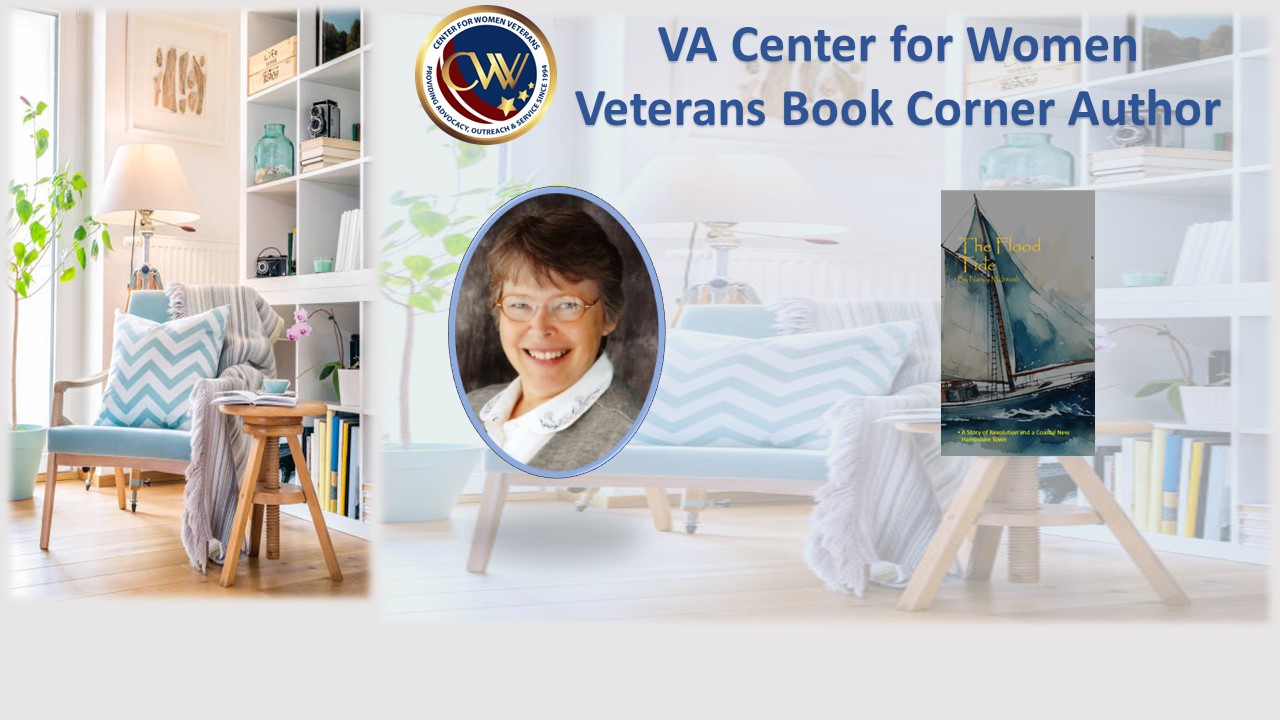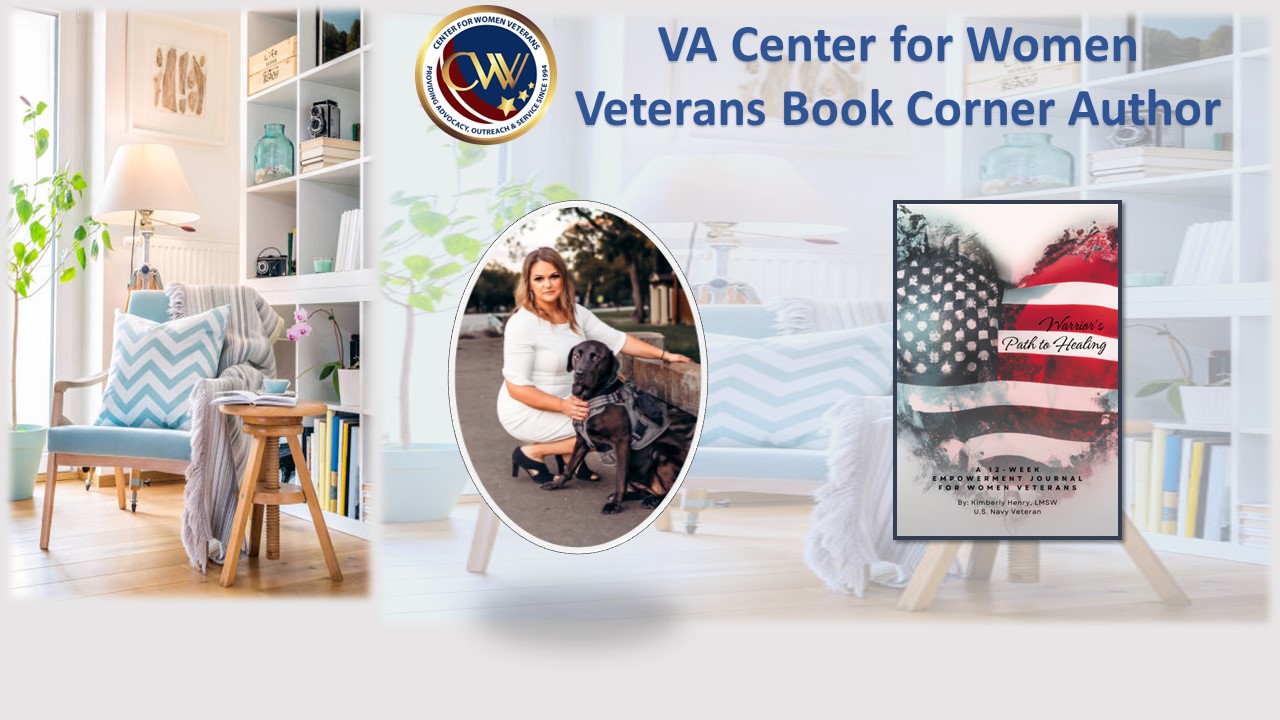This month’s Center for Women Veterans Book Corner author is Coast Guard Veteran Nancy McIntosh, who served as both an enlisted small boat coxswain and an officer from 1977 to 1991. She wrote “The Flood Tide,” an historical novel set during the American Revolution and follows a boatbuilder father and his soldier son. Much of it is set on the Piscataqua River in southeastern New Hampshire where the author grew up as a fourteenth-generation American.
Can you share a brief background of your military experience?
I enlisted in 1977 following a very brief career as a middle school music teacher. Following basic training and A school, I was fortunate to be assigned to a small boat station on Cape Cod where I became one of the Coast Guard’s first female search and rescue coxswains. After three years, I was assigned to a 95-footer and helped out with the Mariel boat lift in the summer of 1980. OCS followed, and an assignment to USCGC Evergreen where we did tests of the “new” satellite navigation systems in the Arctic, along with iceberg drift studies. A year as an intelligence analyst closed out my first full stint on active duty in 1984. In 1987, another fortunate billet came along, where I served as the Coast Guard coordinator for drug-air interdiction in Nassau Bahamas. I “fell” into this assignment as my husband was the CG liaison to the Bahamian government and I was already living in the Bahamas. OPBAT was a very successful coordination between the Bahamian Police and Coast Guard H3 helicopters.
What inspired you to write a book and share your story as a woman Veteran?
While this book is fiction, it is inspired by much of my time off the New England seacoast and also my time in service. The book will, I hope, challenge people to look at the history and sacrifices that were made by our ancestors.
How has your military background influenced your writing style and the themes you explore in your work?
If you have “been there, done that,” the dialog and action flow easily from the pen. Folks who have been to sea in foul weather in a small craft will identify fully.
How do you hope your book will impact other women Veterans, active duty service members and the general public?
I would hope that it would inspire service and willingness to sacrifice, whether it is under arms or in other ways that protect our nation and improve our humanity.
What role do you think storytelling and literature play in fostering understanding and support for the women Veteran’s community?
I think a good story can always make people sit up and listen or be moved to find their own way to serve. Placing ourselves in the protagonist’s shoes opens our minds to other ways of viewing reality.
Can you share a memorable experience or anecdote from your time in the military that has had a lasting impact on your life and writing?
Being at sea at night in the arctic takes your breath away, and then it refills your being, filling any flaccid places you might have had. It stretches your awareness of the planet, and you stay stretched.
Are there any fellow women Veteran authors or books that have inspired or resonated with you? If so, could you tell us a bit about them?
“Breaking Ice and Breaking Glass,” by Vice Admiral Sandra Stosz, USCG ret. Although she served over a decade after me, many of her experiences as a woman in the Coast Guard rang true, both the good and the bad.
How do you believe the Women Veterans Book Corner can help bring awareness to the civilian and military communities, particularly about women Veterans?
As a female Veteran (granted, an old one), I have often been frustrated trying to express my view of “what it was like.” More books and more voices expressing lived experience make that job easier.
What advice do you have for other women Veterans or active duty service members who may be considering writing about their experiences?
Just do it. Don’t rush it. If it is a memoir, write things down and stick them in a file until the “time” comes. You’ll know when you’re ready. If it’s fiction, dwell with your characters for as long as it takes until you can clearly hear your own voice in them. The truth of your service will find a way out even if you don’t know it’s happening.
How has writing this book helped you?
Fiction can be a tremendous way to reflect truth. Sometimes it helps you recognize truth. I am sure it is very different for every writer. This is my first book. The next one has many things to teach me.
Can you tell us about any upcoming projects or events you’re involved in that our audience might be interested in?
I am thinking about another novel, science fiction set in close-earth orbit. Basically, Coast Guard in Space. It may be a hoot.
Are you a woman Veteran author, or do you know of one?
If so, please visit our website to find out more information. If you have further questions, contact the CWV Outreach Program Manager Michelle Terry at 00W@VA.Gov.
Topics in this story
More Stories
At VA, we put women Veterans at the center of your care with a personalized Whole Health approach for your unique needs and goals.
This month's Center for Women Veterans Book Corner author is Navy Veteran Kimberly Henry, who served as a Cryptologic Technician and Sexual Assault Victim Advocate from 2009-2019. She created "Warrior's Path to Healing: A 12-Week Empowerment Journal for Women Veterans."
Thinking about building a family or exploring fertility treatments? VA can support you with a wide range of services.







At age 81 and in good health, I sometimes wonder if I should write a book re. childhood, young manhood, Navy career and travels, lessons learned as adult, father, grandfather.
Your advice?